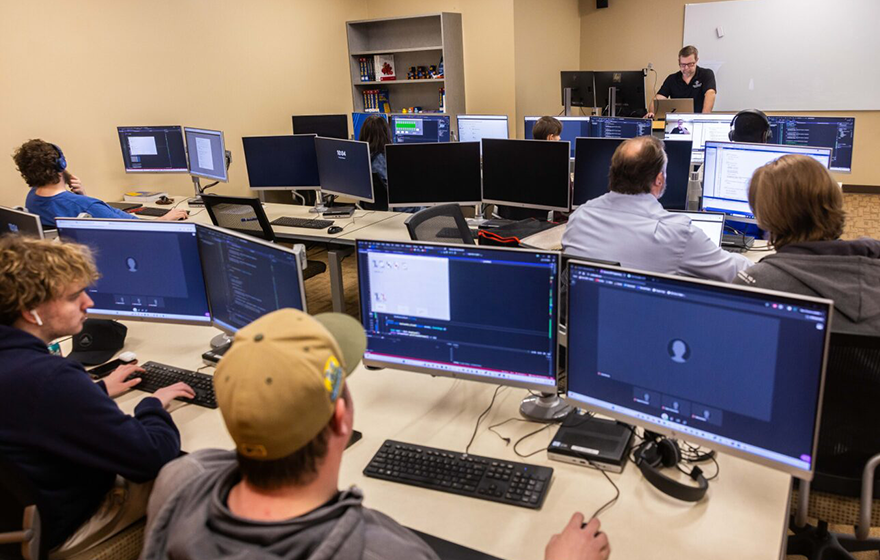Finding the Suitable Software Development Partner for Innovative Solutions
Finding the Suitable Software Development Partner for Innovative Solutions
Blog Article
Devoted Developers vs. In-House Teams: Which Is Right for You?
The choice between utilizing devoted designers and preserving an internal group is a significant one that can impact the trajectory of your jobs and overall business strategy. Dedicated developers supply a level of adaptability and customized experience that can be advantageous for details, short-term initiatives. Alternatively, in-house teams add to a cohesive firm culture and a nuanced understanding of lasting objectives. By checking out critical variables such as budget, task extent, and wanted control, you can better figure out which strategy aligns with your organizational needs. The implications of this choice extend past prompt end results-- think about the broader influence on your company landscape.
Understanding Dedicated Designers
The growing need for specialized skills in the tech sector has actually brought about the development of dedicated programmers as a practical remedy for many companies. These professionals are usually gotten on a task basis, permitting companies to leverage specific competence without the long-lasting dedication connected with permanent hires. Committed developers are usually ingrained within a client's team, offering adaptability and scalability to meet task demands.
This design allows organizations to access a worldwide skill pool, which is especially useful in a rapidly advancing technical landscape. Devoted designers can be sourced from numerous geographical places, making certain that companies can locate the right ability at competitive rates. They often bring a wealth of experience and knowledge, having functioned on diverse projects throughout various industries.
Additionally, dedicated designers can focus solely on the tasks available, improving performance and efficiency. They are geared up to incorporate perfectly into existing workflows, teaming up closely with internal groups to attain job purposes. This technique not only reduces the worry of employment and training yet also allows organizations to stay nimble, adapting swiftly to transforming market needs and technical innovations.
Benefits of In-House Teams

Additionally, internal groups tend to have a deeper understanding of the business's objective, values, and goals. This placement can boost employee engagement and inspiration, as team members really feel more attached to their job and the company's success. Furthermore, having a devoted internal team permits far better placement of goals and techniques, as these participants are constantly concentrated on the firm's priorities.
In-house groups also promote quicker decision-making procedures, as they can respond extra rapidly to changes and obstacles. The well established partnerships and knowledge with business protocols permit streamlined workflows and decreased miscommunication. Inevitably, the mix of a cohesive society, positioning with business objectives, and reliable communication makes internal teams an important possession for lots of organizations, specifically those aiming to cultivate lasting growth and technology.
Cost Considerations
When assessing price factors to consider, both internal groups and specialized designers existing distinctive monetary ramifications for companies. Involving dedicated developers typically includes a pay-per-project or per hour rate model, which can be economical for organizations with changing project demands. This method allows for versatility in scaling resources up or down, making certain that firms just pay for the services they require.
In comparison, internal groups involve repaired costs, consisting of salaries, advantages, and overhead expenses such as office and equipment. While this attorney website design version supplies greater control and prompt accessibility of sources, it might result in higher long-lasting expenditures, particularly if the work does not validate a full-time team.
Additionally, companies must think about the concealed costs related to recruitment and training of in-house staff members, which can further stress budget plans. In some cases, the moment and resources spent on managing an in-house group can diminish the company's core company goals.

Project Management and Versatility
Project monitoring and flexibility are crucial aspects that affect the choice between in-house groups and devoted programmers. Devoted designers generally supply a high level of adaptability, allowing companies to range resources up or down based upon task demands. This dexterity can be specifically advantageous for companies experiencing rising and fall work or those augmented reality android studio seeking to introduce quickly. Committed groups commonly have actually developed procedures for taking care of tasks successfully, leveraging details approaches like Agile or Scrum, which assist in iterative development and versatility.

Inevitably, the selection in between internal groups and dedicated programmers hinges on the wanted degree of flexibility and the details job administration demands. Companies need to examine their functional dynamics, job intricacy, and source accessibility to identify which choice aligns ideal with their strategic purposes.
Making the Right Choice
Selecting the best development strategy-- dedicated developers or in-house teams-- calls for a mindful assessment of numerous aspects that straighten with a business's strategic goals. offshore software development. Initially, take into consideration the nature of the job. Devoted developers may be much more suitable if it demands specialized skills or a quick scale-up. Conversely, internal teams can supply better connection and integration with existing personnel.
Next, evaluate your budget. Committed programmers typically provide an affordable remedy for temporary jobs, while internal groups may sustain greater long-term costs as a result of incomes, advantages, and overhead prices. Assess the degree of control and cooperation desired; internal teams usually promote more powerful communication and placement with company society.
If immediate outcomes are needed, dedicated developers can be onboarded swiftly, whereas building an internal group takes time for employment and training. If continual growth is crucial, investing in an internal group may generate far better returns over time.
Conclusion
In final thought, the choice between devoted programmers and in-house groups pivots on project needs and organizational objectives. On the other hand, internal teams grow a natural society and much deeper alignment with long-term goals.
The decision between making use of devoted programmers and keeping an internal team is a substantial one that can impact the trajectory of your tasks and general organization strategy.Job management and versatility are important aspects that affect the selection in between internal groups and committed developers. hire dedicated developers.In comparison, in-house teams may succeed in keeping a consistent task management structure due to their familiarity with the organization's society and long-term goals. Committed developers commonly present an economical remedy for short-term tasks, while in-house teams might incur higher long-term expenses due to wages, advantages, and overhead expenses.In conclusion, the decision between in-house teams and devoted programmers hinges on task needs and organizational goals
Report this page